5th Japan Construction International Award
Special Award (Pioneering Activity Category)
- Development of grassroots road infrastructure and poverty reduction through enhancement of self-reliance initiatives of communities in Sub-Saharan Africa
- Strategic training of local engineers and companies through railway rehabilitation projects in Southeast Asia
- Open Innovation for construction technology in Silicon Valley
Development of grassroots road infrastructure and poverty reduction through enhancement of self-reliance initiatives of communities in Sub-Saharan Africa
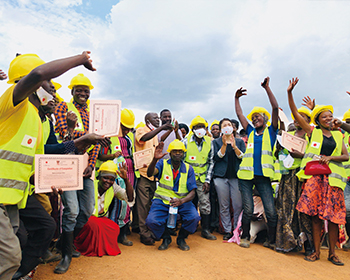
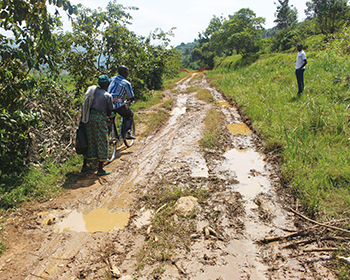
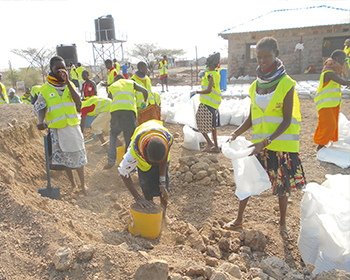
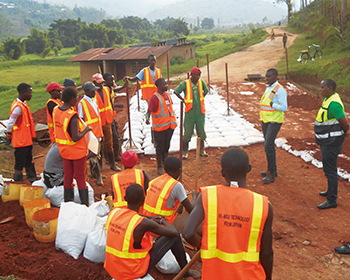
Project activity overview
- In Sub-Saharan Africa where the road infrastructure, such as community roads and agricultural roads, is in poor condition, this NGO has transferred technology to local residents that enables them to improve roads by labour intensive method using locally available materials.
- The NGO has contributed to poverty reduction by making schools, hospitals, and markets more accessible to people and developing human resources for the construction industry through road infrastructure improvement activities.
- In collaboration with the International Labour Organization (ILO) and the Kenyan government, the NGO has trained about 810 youths on Do-nou(Japanese term for soilbag) technology at the National Construction Skill Training Center.
Data
Period:From January 2008~
Applicant:Community Road Empowerment
Country of activity:Kenya(main base) / Uganda /Rwanda / Burkina Faso
Excellent points of the project activities
- Road improvement skills, including Do-nou technology that enables roads to be improved by labour intensive method using locally available materials, have been transferred to 13,377 local communities in Sub-Saharan Africa. A total of 76,874 meters of roads have been improved so far. This technology, locally called “Do-nou technology”, is known as a Japanese road maintenance and improvement technique.
- The NGO has established a framework for poor unskilled youths with little access to job opportunities to acquire basic skills through road improvement activities in this project and launch into construction business,contributing to grassroots infrastructure improvement efforts. To date, as many as about 40 construction companies have been founded in Kenya, and 24 groups who completed the training have annual contracts for routine road maintenance with county governments in Rwanda.
- The local governments have evaluated and recognized the effects of the Do-nou technology and the training of youths. Moreover, the NGO is making efforts to create a manual on this technology and establish a curriculum for vocational schools in cooperation with the local governments.
Strategic training of local engineers and companies through railway rehabilitation projects in Southeast Asia
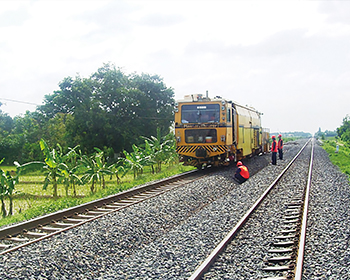
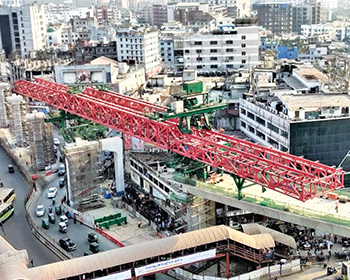
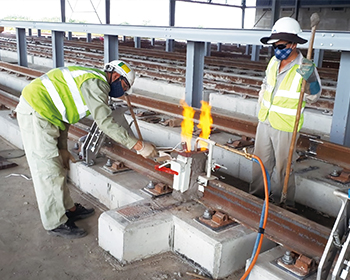
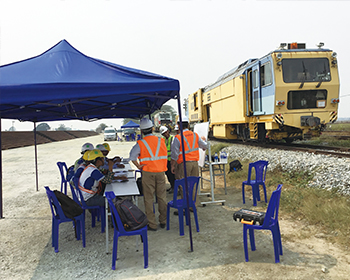
Project activity overview
- The company has strived to transfer Japanese-style railway technologies and know-how through railway and other infrastructure rehabilitation projects contributing to sustainable growth and development, mainly in the form of ODA projects in Southeast Asia. The company’s unparalleled, unique and strategic efforts involved the stationing Japanese engineers with rich overseas experience to introduce Japanese construction machinery and provide operation instruction; providing technical assistance, including sending technical intern trainees to Japan; and creating a consistent training system covering everything from hiring institute of technology students to training them in Japan.
- For the Java North Line double-tracking works in Indonesia, Japanese-style mechanized construction was introduced to the project and instruction and training were also provided to local engineers, despite manual labor being the norm then. The company realized the shortening of the construction period and the improvement of the safety and efficiency of the work, as well as the technology transfer, making a huge contribution to the modernization of railway construction in the country.
- In the project for improving the safety of the North-South railway bridges in Vietnam, the company completed the highly difficult bridge replacement works with careful Japanese-style planning and management, in cooperation with local partner companies. Later, the company invited their engineers to Japan as technical intern trainees, helping them to acquire techniques such as rail welding and track maintenance.In the project for improving the safety of the North-South railway bridges in Vietnam, the company completed the highly difficult bridge replacement works with careful Japanese-style planning and management, in cooperation with local partner companies. Later, the company invited their engineers to Japan as technical intern trainees, helping them to acquire techniques such as rail welding and track maintenance.
- For the National Road 5 improvement work in Cambodia, the company created a unique training system for securing competent local engineers. Young and excellent engineers were raised by this system through the application of a consistent program to the graduates of the Institute of Technology of Cambodia. The program involved internships, hiring as employees, Japanese language acquisition assistance, and two-year training in Japan.
Data
Period:From August 1999~
Applicant:TEKKEN CORPORATION
Country of activity:Indonesia / Vietnam / Myanmar / Cambodia / Bangladesh
Relevant Companies
SENKEN KOGYO CO., LTD.
THANH PHAT CONSTRUCTION WORK JOINT STOCK COMPANY
PT.THAMRIN CITRA MULIA
PT.MODERN SURYA JAYA
Excellent points of the project activities
- To continuously promote overseas business operation, the company trained local engineers strategically through ODA projects. After the completion of these projects, the company regarded partner companies as important partners in Southeast Asia, investing and supporting technology acquisition assistance. They successfully won railway project contracts in surrounding countries in collaboration with trained local engineers and partner companies.
- The mechanization of construction, introduced in Indonesia, led to some trained engineers starting their own business, growing enough to win track maintenance contracts from the Indonesia National Railways, and thus contributing to the industrialization of the country. For railway track repair projects in Myanmar, the company procured track maintenance vehicles from Japan, and instructed driving skills and know-how to local engineers directly, which is highly regarded by Myanmar National Railways.
- In Vietnam, achievements such as the completion of the highly difficult bridge replacement work and technology transfer and engineer training through the works, were highly evaluated by persons in the railway industry in the country, leading to the company receiving a letter of appreciation from the Minister of Transport of Vietnam.
- The company created a system aimed at transferring advanced Japanese construction technologies to local students and having them adopt those technologies, by bringing them into the company as interns and training them in Japan for two years. Subsequently, the company instructed local engineers in their own and surrounding countries.
Open Innovation for construction technology in Silicon Valley
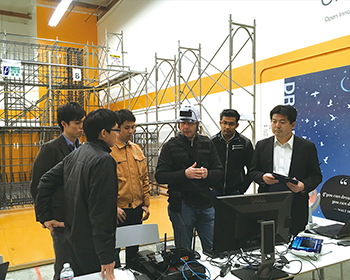
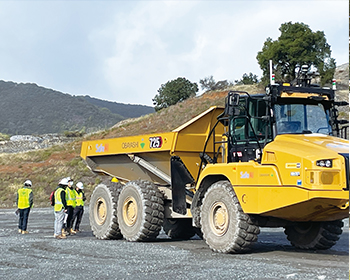
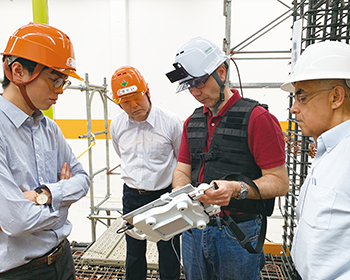
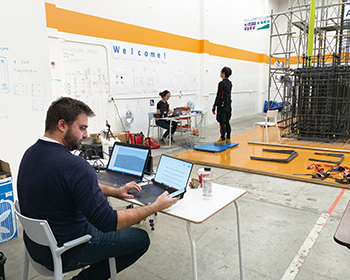
Project activity overview
- By focusing on digitalization in the construction industry, which had lagged behind other industries, the company created a base for collaborating and experimenting with local research institutes and start-up companies in an effort to practice open innovation in Silicon Valley.
- By drawing on the resources obtained from more than 40 years of business operations in the United States, OBAYASHI developed products and services aimed to improve productivity, safety, and quality throughout the construction industry.
- At present, the company is developing services jointly with more than ten companies, making direct investment in ten start-up companies and venture capital investment in five funds.
Data
Period:From October 2017~
Applicant:Obayashi SVVL, Inc. (OBAYASHI CORPORATION)
Country of activity:United States
Excellent points of the project activities
- Given the strengths of a major Japanese construction company, which has an internal research and development division, combined with the name recognition that resulted from more than 40 years in the U.S. market, the company has been selected as a partner by start-up companies and research institutes. The company acts as a mediator in Japan-U.S. open innovation projects.
- The company was the only Japanese construction company selected by a U.S. industry journal as one of the 50 Contech venture investors (20 companies in the corporate venture capital category).
- The company established its R&D Garage to practice Silicon-Valley-style Design Thinking and agile development. By providing realistic mock-up test environments in which prototypes could be tested from early stages as many times as necessary, the company successfully encouraged digital engineers to understand the practicalities of operations on construction sites and increase their development speed at the same time.
- The company developed high-quality products and services that are expected to contribute to infrastructure development, such as Powered Clothing®, intended to reduce the fatigue of site workers, and an AI-based service for predictive analytics of unsafe situations on a construction site. The remote site management tool, which uses 360-degree images, is expected to be utilized in overseas construction projects.